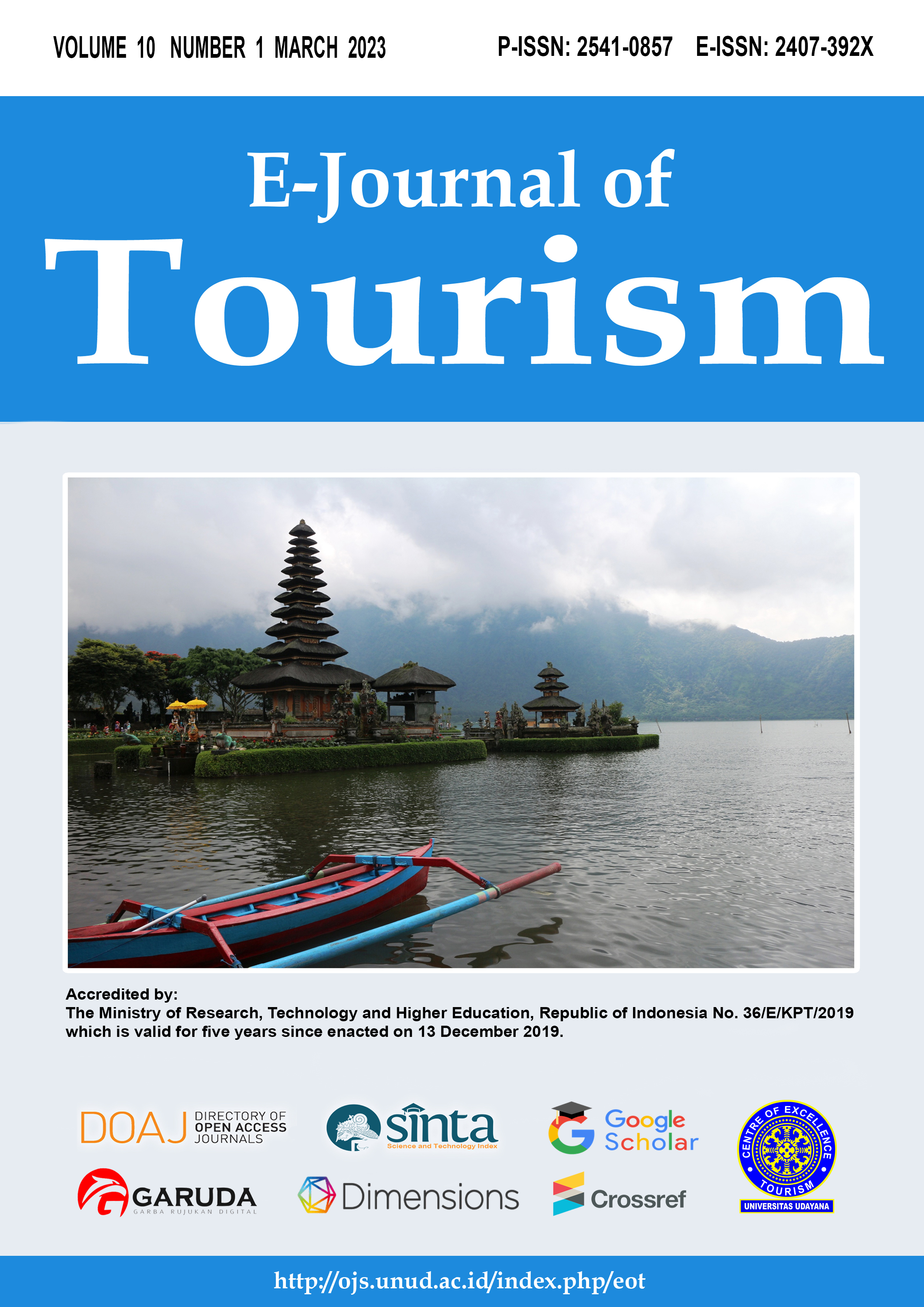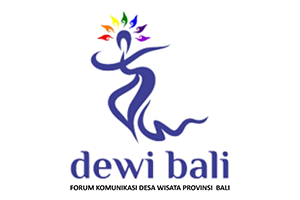How Digital Technology Enhances Hotel Experience? Examining Experiential Marketing of Two Four-Star Hotels in Yogyakarta
Abstract
This study intends to understand how digital technology in particular digital marketing and e-commerce enhance hotel experience. There are few studies discussing how these aspects of technology enhances hotel experience through adoption of the sensory elements of experiential marketing. This is a qualitative study conducted through observation and authors’ individual experience of digital and e-commerce channels of the two four-star hotels in Yogyakarta. Content analysis was used to draw conclusion about the data obtained from observation, individual experience and electronic media of professional publications. The results suggest that stimulating and enhancing hotel experience with digital marketing and e-commerce was inseparable with involving the sensory elements. Moreover, the two hotels not only optimized the sensory elements, but also presented these elements interestingly, creatively, uniquely and thoughtfully. Those sensory elements were designed to communicate, persuade and impact users of the hotels whilst observing consistency and clear purpose. This study extends the hotel sector digital and experiential marketing literature. Moreover, the study’s results assist hotel service providers in understanding the importance of involving experiential aspects in their marketing. Thus, the paper relieves hotel managers for more added values especially in marketing plans. However, this study focuses exclusively on four-star hotels in Yogyakarta Region in Indonesia.
Downloads
References
Alsharayri, M. A. (2011) ‘The E-Commerce impact on improving accounting information system in Jordanian Hotels’, International Research Journal of Finance and Economics, 75, pp. 14-23.
Bala, M. and Verma, D. (2018) ‘A critical review of digital marketing’, International Journal of Management, IT and Engineering, 8 (10), pp. 321-339.
Bang, A. and Roos, C. (2014) ‘Digital marketing strategy within manufacturing industry–a qualitative case study’, Digitala Vetenskapliga Arkivet, pp. 193.
Bhaleker, P., Ingle, S., and Pathak, k. (2014) ‘The study of E-commerce’, Asia Journal of Computer Science and Information Technology, 4 (3), pp. 25-27.
Biedekarken, O. and Henneberg, S. (2006) ‘Influence of brands on taste acceptance: ice cream brand versus discount brand; brand recognition influences sensory acceptance positively or negatively, an effect that can sometimes be quite dramatic’, Food Engineering and Ingredients, 9 ( 1) , pp. 24-26.
Binkhorst, E., and Dekker, T. (2009) ‘Agenda for Co-Creation Tourism Experience’, Journal of Hospitality Marketing & Management, 18 (2), pp. 311-327.
Bitner, M. J. (1992) ‘Services capes: The impact of physical surroundings on customers and employees’, Journal of Marketing, 56 (2), pp. 57–71.
Carlson, R. (1997) Experienced cognition. New York: Lawrence Erlbaum Associations.
Carvalho, S. and Carvalho, J.V. (2020) ‘The implications of digital marketing and e-commerce in the tourism sector growth. In Advances in Tourism, Technology and Smart Systems’, Proceedings of ICOTTS 2019, pp. 161-170, Springer Singapore.
Chang, S.E., Shen, W.-C. and Liu, A.Y. (2016) ‘Why mobile users trust smartphone social networking services? A PLS-SEM approach’, Journal of Business Research, 69 (11), pp. 4890-4895.
Chen, S. and Lin, C. (2019) ‘Understanding the effect of social media marketing activities: the mediation of social identification, perceived valve, and Satisfaction’, Technology forecasting and social change, 140, pp. 22-32.
Citrin, A.V., Stern, D.E., Spangenberg, E.R. and Clark, M.J. (2003) ‘Consumer need for tactile input: an internet retailing challenge’, Journal of Business Research, 56 (11), pp. 915-22.
Cunha, M.N. (2019) ‘The tourism journey, from inspiration to post-travel phase, and the mobile technologies’ African Journal of Hospitality, Tourism and Leisure, 8 (5), pp.117.
Eze, S.C., S.C. et al., (2020) ‘Critical factors influencing the adoption of digital marketing devices by service-oriented micro businesses in Nigeria: a thematic analysis approach’ Humanities and Social Sciences Communications, 7 (1), pp. 1-14.
Fiore, A.M., Yah, X. and Yoh, E. (2000) Effects of a product display and environmental fragrancing on approach responses and pleasurable experiences’, Psychology Marketing, 17, pp. 27-54.
Fong, L.H.N., Lam, L.W. and Law, R. (2017) ‘How locus of control shapes intention to reuse mobile apps for making hotel reservations: evidence from Chinese consumers’, Tourism Management, 61, pp. 331-342.
García, J. A. C., Galindo, A. D. V., and Suárez, R. M. (2018) ‘The effect of online and offline experiential marketing on brand equity in the hotel sector’, Spanish journal of marketing-ESIC.
Garlin, F.V. and Owen, K. (2006) ‘Setting the tone with a tune: a meta-analytic review of the effects of background music in retail settings’, Journal of Business Research, 59, pp. 755-64.
Goldkuhl, L. and Styfve´n, M. (2007) ‘Scenting the scent of service success’, European Journal of Marketing, 41 (11/12), pp. 1297-305.
Gong, W. (2009) ‘National culture and global diffusion of business‐to‐consumer e commerce’, Cross cultural management: an international journal, 16 (1), pp. 83-101
Hirschman, E., and Holbrook, M. (1982) ‘Hedonic Consumption: Emerging Concepts, Methods and Propositions’, Journal of Marketing, 46 (3), 92-101.
Hua, N., Hight, S., Wei, W., Ozturk, A. B., Zhao, X. R., Nusair, K., and DeFranco, A. (2019) ‘The power of e-commerce: Does e-commerce enhance the impact of loyalty programs on hotel operating performance?’, International Journal of Contemporary Hospitality Management, 33 (10), pp. 3514-3534.
Hultén, B. (2011) ‘Sensory marketing: the multi‐sensory brand‐experience concept’, European business review, 23(3), pp. 256-273.
J. Crolts et al. (2008) ‘A Survey method for identifying key drivers of guest delight’, International Journal of contemporary Hospitality management, 53 (2), pp. 492-506.
Kannan, P.K. and Li, H. (2017) ‘Digital marketing: a framework, review and research agenda’, International Journal of Research in Marketing, 34 (1), pp. 22-45.
Klosse, P.R., Riga, J., Cramwinckel, A.B. and Saris, W.H.M. (2004) ‘The formulation and evaluation of culinary success factors that determine the palatability of food’, Food Service Technology, 4 (3), pp. 107-155.
Krishna, A., Cian, L., and Sokolova, T. (2016) ‘The power of sensory marketing in advertising’, Current Opinion in Psychology, 10, 142-147.
Leonard, L.N.K. (2011) ‘Attitude influences in C2C e-commerce: buying and selling’, Journal of Computer Information Systems, 52 (3), pp. 11-17.
Li, y. (2000) ‘Geographical consciousness and tourism experience’, Ann. Tourism Res., 27 (4), pp. 863 883.
Lucking-Reiley, D., and Spulber, D. F. (2001) ‘Business-to-business electronic commerce’, Journal of Economic Perspectives, 15(1), pp. 55-68.
Magano, J. and Cuncha, M.N. (2020) ‘Digital marketing impact on tourism in Portugal; a quantitative study’, African Journal of Hospitality, Tourism & Leisure, 9 (11), pp. 1-19.
Mariani, M.M., Di Felice, M. and Mora, M. (2016) ‘Facebook as a destination marketing tool: evidence from Italian regional destination management organizations’, Tourism management, 54, pp. 321-343.
Mcintosh, A.J. and Siggs, A. (2005) ‘An exploration of the experiential nature of boutique accommodation’, Journal of Travel Research, 44 (1), pp. 74-81.
Mkwizu, K.H. (2020) ‘Digital marketing & tourism: opportunities for Africa’, International Hospitality Review, (1), pp. 5-12.
Neutrofer, B., Buhalis, D., and Ladkin, A. (2015) ‘Smart technologies for personalized experiences: a case study in the hospitality domain’, Electronic Markets, 25(3), pp. 243-254.
No, E. and Kim, J.K. (2014) ‘Determinants of the adoption of travel information on smartphone’, International Journal of Tourism Research, 16 ( 6), pp. 534-545.
Parvez, S. J., Moyeenudin, H. M., Arun, S., Anandan, R., and Janahan, S. K. (2018) ‘Digital marketing in hotel industry’, International Journal of Engineering & Technology, 7(2.21), pp. 288-290.
Peck, J. and Wiggins, J. (2006) ‘It just feels good: customers’ affective response to touch and its influence on persuasion’ Journal of Marketing, 70, pp. 56-69.
Pine, B.J. and Gilmore, J.H. (2011). The experience economy. Harvard Business Review Press, Boston.
Pine, J., and Gilmore, J.H. (1998). Welcome to the experience economy. Harvard Business Review, 76 (4), pp. 97-105.
Quinlan-Cutler, S., and Carmichael, B. (2010) ‘The dimensions of customer experience. In: M. morgan, P, lugos, Ritchie (org) (Eds.). The tourism in leisure experience: consumer & managerial perspectives’, Aspects of tourism, pp. 3-26, Bristol.
Reid, Robert D. and Bojani, David C. (2018). Hospitality Marketing Management, 4th Edition. New York: John Wiley & Sons Inc.
Schmitt, B.H. (2000). Experiential Marketing. Deusto, Barcelona.
Scott, N., Laws, E., and Boksberger, P. (2009) ‘The Marketing of Hospitality and Leisure Experiences’, Journal of Hospitality Marketing & Management, 18 (2-3), pp. 99-110.
Segittur (2014). Impacto de la innovacio’n y las nuevas technologies en los ha’bitos del Nuevo turista en Espania. Retrieved from: www.segittures/opencms/export/sites/segiturl.content/galerias/descargas/documentos/Ipacto-de-la-Imovacin-y-las-nuevas-tecnologas-en-los-hbitosdel-to-pdf.
Spies, K., Hesse, F., and Loesch, K. (1997) ‘Store atmosphere, mood and purchasing behavior’, International Journal of Research in Marketing, 14(1), pp. 1–17.
Stamboulis, Y., and Skayannis, P. (2003) ‘Innovation strategies and technology for experience based tourism’, Tourism Management, 24 (1), pp. 35-43.
Sweeney, C.J. and Wyber, F. (2002), ‘The role of cognitions and emotions in the music approach-avoidance behaviour relationship’, Journal of Services Marketing, 16 (1) pp. 51-70.
Werthner, H., and Ricci, F. (2004). E-commerce and tourism. Communications of the ACM, 47(12), pp. 101-105.
Xu, S., Kim, H.J., Liang, M. and Ryu, K. (2018) ‘Interrelationships between tourist involvement, tourist experience, and environmentally responsible behavior: a case study of Nansha Wetland Park’, Journal of Travel and Tourism Marketing, 35 (7), pp. 856-868.
Yasmin, A., Tasneem, S. and Fatem, K. (2015) ‘Effectiveness of digital marketing in the challenging age: an empirical study’ International Journal of Management Science and Business Administration, 1 (5), pp. 69-80.

This work is licensed under a Creative Commons Attribution 4.0 International License.
The copyright of the received article shall be assigned to the journal as the publisher of the journal. The intended copyright includes the right to publish the article in various forms (including reprints). The journal maintains the publishing rights to the published articles.




















